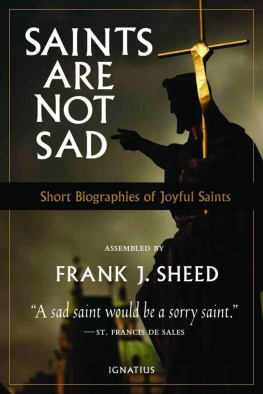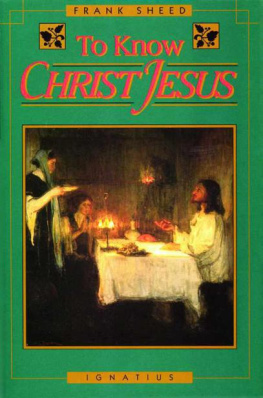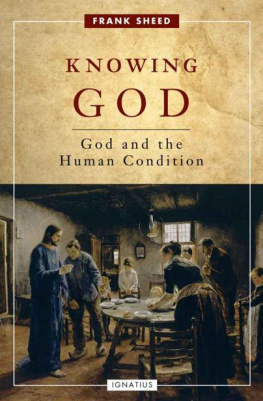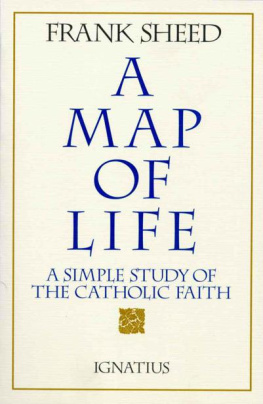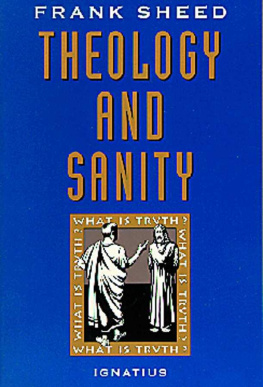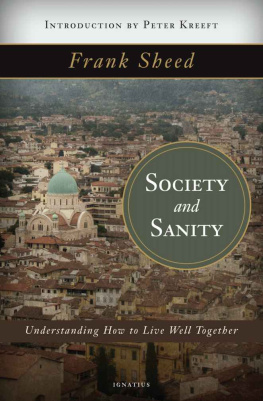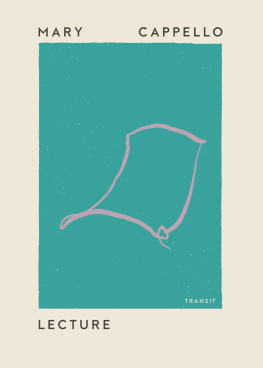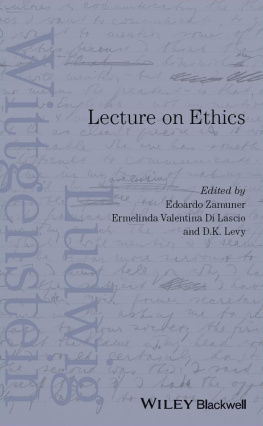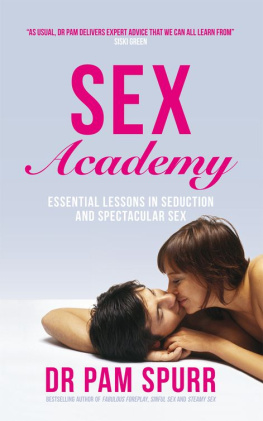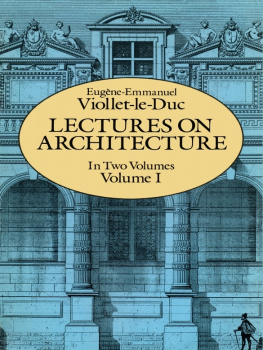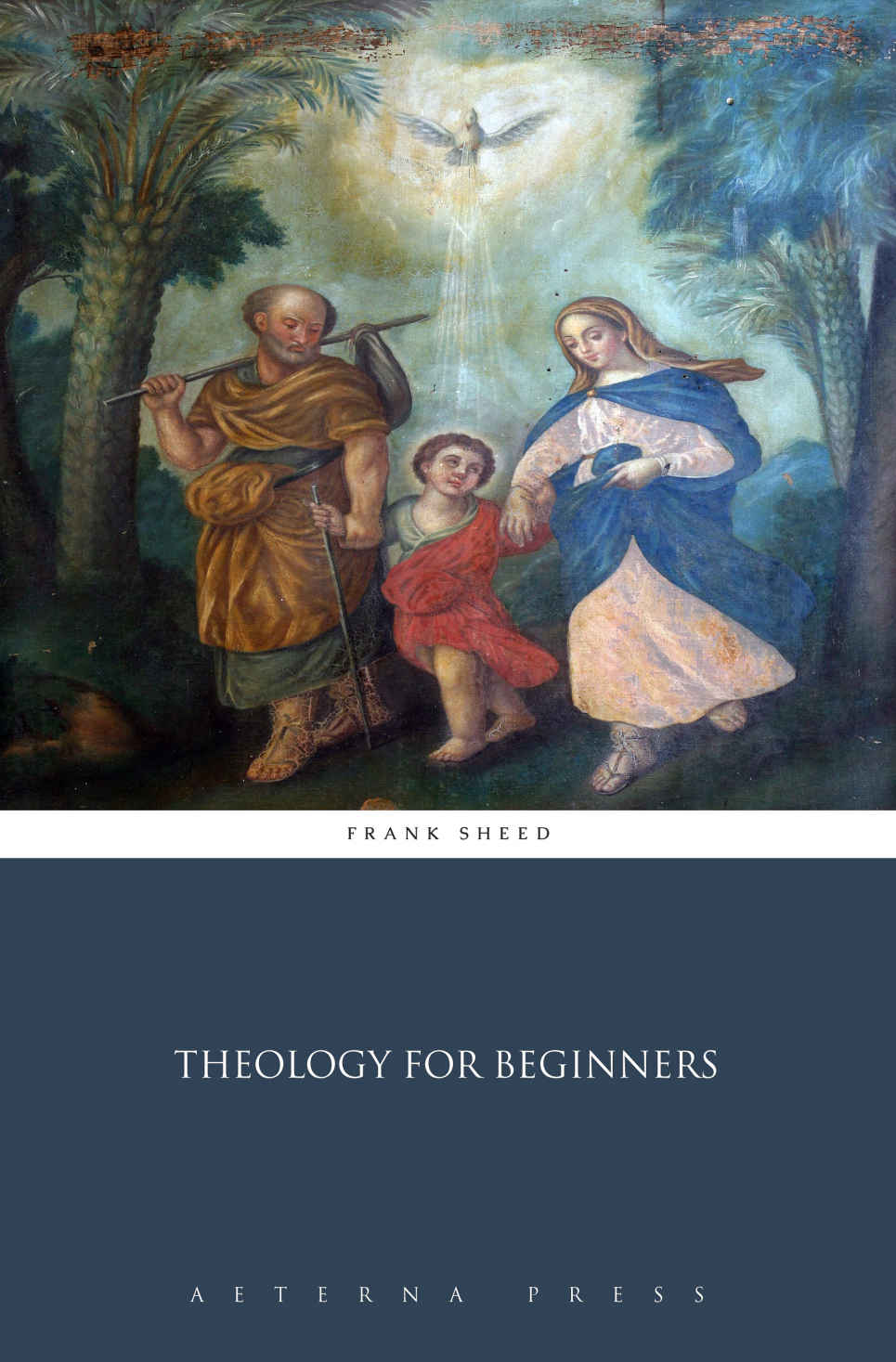COPYRIGHT 201 BY AETERNA PRESS .
ALL RIGHTS RESERVED.
AVAILABLE IN PAPERBACK.
I
WHY STUDY THEOLOGY?
A couple of years ago I visited a town where I was to lecture. A young woman told me she was coming to my lecture, and then asked what it was to be about. I said The Blessed Trinity. She said Oh, and then after a distinct pause Ah well. In other words, if her Bishop wanted her to listen to a lecture on the Blessed Trinity, she would listen to it: she hoped, doubtless, that she would do even harder things if her Bishop called for them. The one thing that emerged most definitely was that she expected no joy. And in that she represented any number of millions of her fellow Catholics. As a body, we hope to go to heaven, which means spending eternity with the Blessed Trinity, and we expect the experience to be wholly blissful; but in the prospect of spending an hour with the Blessed Trinity here below, there is no anticipation of bliss.
The incident took me back thirty years. I was a boy, and I had remarked to a theologian how sad it was that a layman could not get a course in theology. He said But why should you study theology? You are not obliged to. In my new excitement over dogma, I was quite incapable of giving any lucid answer to his question why. I mumbled something to the effect that the truth would make me free, and I wanted to be free. I shall try now to answer that question of thirty years back.
In a way I am still hampered now as I was then by a feeling of the strangeness of having to make a case for anything so exciting and so joy-giving. But the joy and excitement of theological knowledge is like the joy and excitement of any other loveit cannot be explained to one who has not experienced it; it need not be explained to one who has. I shall keep, therefore, to the plainest of reasons. Truth is food and truth is light.
Not on bread alone doth man live, said Christ Our Lord, quoting Deuteronomy to the Devil. Everybody knows the phrase, and most people tend to complete it according to their own fancy of what is most important to the hungry soul of man. But it had its own completion in Deuteronomy and Our Lord reminded the Devil of that toobut by every word that proceedeth from the mouth of God. Revealed truth, then, is food. Now it is a peculiarity of food that it nourishes only those who eat it. We are not nourished by the food that someone else has eaten. To be nourished by it, we must eat it ourselves.
Truth is light too. Not to see it is to be in darkness, to see it wrong is to be in double darkness. The greater part of reality can be known only if God tells us: doctrine is what He tells: lacking it, we lack light. To be stumbling along in the dark, happy in the knowledge that our guides can see, is not at all the same thing as walking in the light. It is immeasurably better than stumbling through the dark with blind guides but it is poverty all the same.
It will be said that no Catholic can go wholly unnourished, for there is the Eucharist, or wholly in the dark, because of the truths that the Church does manage to get through to the least interested of her children. As to the Eucharist, this is most gloriously true, though even there a man will be helped by going as far into the doctrine as the Church can take him, that he may know better by what food his soul lives. But as to the truths, I am not at all so sure. Some monstrous shapes flit about the Catholic mind: I remember an educated Catholic who was asked how God could be in three Persons and answered, God is omnipotent, and can be in as many persons as He likes; and another who, having broken his fast and wishing to go to Communion, thought it would be all right provided he went to confession first; and having kept no record, I cannot tell the number of times I have heard the phrase The poor Holy Ghost, He is so neglectedthat is, He does not get much of our attention and must make out as best He can with the company of the Father and the Son!
Let us not labor this. A Catholic, thank God, never can be wholly unnourished or wholly in the dark. But he may be living an undernourished life in the half-dark, and that is a pity.
I cannot say how often I have been told that some old Irishman saying his rosary is holier than I am, with all my study. I daresay he is. For his own sake, I hope he is. But if the only evidence is that he knows less theology than I, then it is evidence that would convince neither him nor me. It would not convince him, because all those rosary-loving, tabernacle-loving old Irishmen I have ever known (and my own ancestry is rich with them) were avid for more knowledge of the Faith. It does not convince me because while it is obvious that an ignorant man can be virtuous, it is equally obvious that ignorance is not a virtue; men have been martyred who could not have stated a doctrine of the Church correctly, and martyrdom is the supreme proof of love: yet with more knowledge of God they would have loved Him more still.
Knowledge serves loveit can turn sour of course and serve pride or conceit and not love, and against this we poor sons of Eve must be on our guard.
Knowledge does serve love. It serves love in one way by removing misunderstandings which are in the way of love, which at the best blunt loves edge a littlefor example, the fact of Hell can raise a doubt of Gods love in a man who has not had his mind enriched with what the Church can teach him; so that he is driven piously to avert his gaze from some truth about God in order to keep his love undimmed. But knowledge serves love in a still better waybecause each new thing learned and meditated about God is a new reason for loving Him.
Now a Catholic might still feel that all this is convincing enough, but that none of it is for him all the same: the Church does not command him to go deep into theology; if his soul is not getting all the food it might, it suffers no hunger pangs; the half-dark seems pretty light to him, he knows he loves God; and anyhow it is his own business.
Now in so far as a Catholic is satisfied with what he is getting, there is no more to be said. It is his business; at least its not mine. But life is not only getting; it must be giving as well, and a Catholic can hardly be so easily satisfied, or satisfied at all, with what he is giving. The most obvious fact of our day is that we are surrounded by millions who are starved of food that Christ Our Lord wanted them to havethey are getting too small a ration of truth, and of the Eucharist no ration at all. We regret their starvation, of course, but we do not lose any sleep over it; which raises the question of whether we really appreciate the food we ourselves get from the Church. We should not take it so calmly if their starvation were bodily: for we do know the value of the bread that perishes.
If spiritual starvation is to be relieved, it must be largely the work of the laity, who are in daily contact with starvations victims. We must come to an understanding of the great dogmas, so that we know them in themselves and in their power to nourish; we must bend every effort to mastering their utterance. Only thus can we relieve the starvation that now lies all about us. Once we see it, we see that we must set about itprimarily and overwhelmingly for the sake of these others, since it is intolerable that men should be perishing for want of truth that we could bring them. But not only for their sake. For our own sake too: for it is not good for us, or our children, to be the sane minority in a society that is losing contact with God.
This book will be concerned with theology as meeting the twofold needthe need of our own souls for the food and light and love of God that the great dogmas bring with them; and the need of men all about us, a need which can be met only if we meet it.


